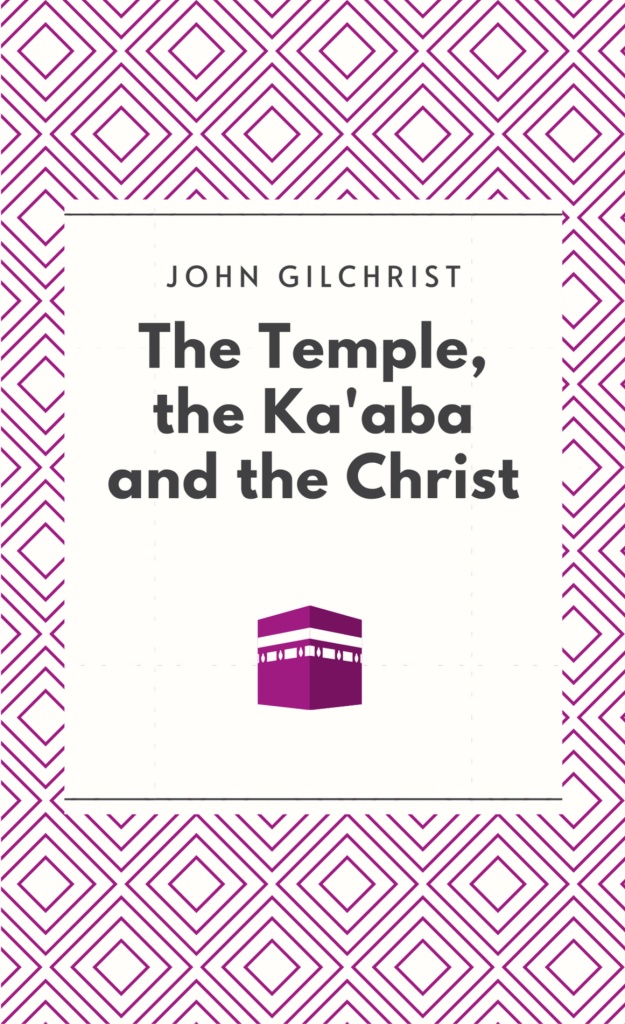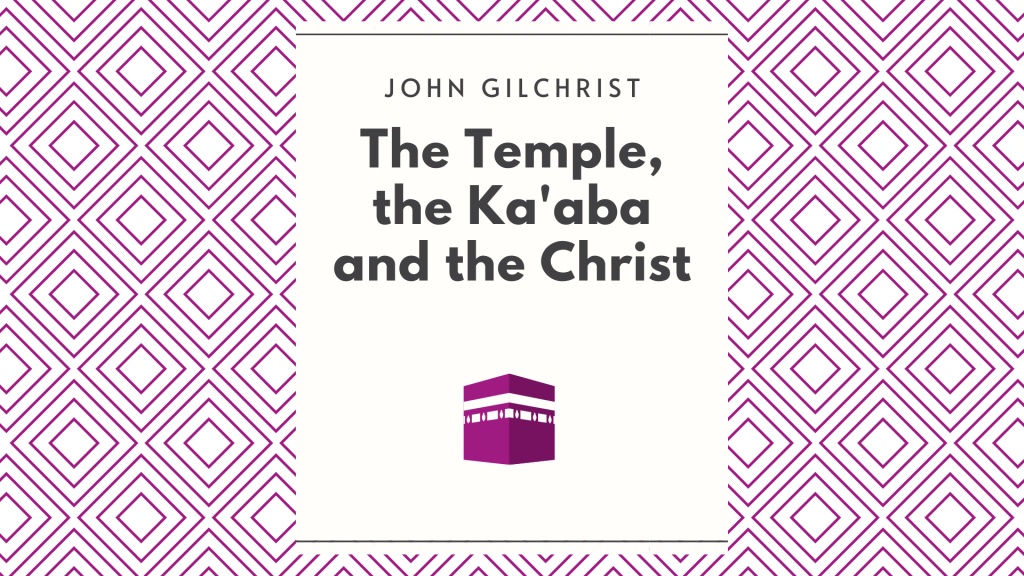The Ka'aba’s Relevance to Solomon's Temple
The Temple, the Ka'aba, and the Christ


Chapters
The issue which we have to consider here is whether the Ka'aba has in fact become, by God's appointment, the replacement of the Temple in this age. The obvious similarities between them can lead one initially to conclude that such a substitution has indeed taken place, and to speculate whether God has, perhaps, taken the true form of worship from the sons of Israel and delivered it to the sons of Ishmael. Certainly the resemblances between the two appear, at first sight, to give some support to this contention.
Nevertheless, when the issue is considered in detail, and when all the facts are carefully compared with one another, the only possible conclusion that can be arrived at is that the Ka'aba, on the contrary, is definitely not that which God has provided as a better means of access to his presence than the Temple of the Jews which stood in Jerusalem.
Firstly, the Qur'an does not claim that the Ka'aba, at the time of the destruction of the Temple, became the centre of true worship. It claims in fact that the Ka'aba was built before the Temple by Abraham and his son Ishmael as a house of worship for God (Quran 2.125-127). The Qur'an, in fact, alleges that from the time of Abraham the Ka'aba became, by God's command, the holiest place of worship on earth:
We made the house (at Mecca) a resort for mankind and a sanctuary, (saying): Take as your place of worship the place where Abraham stood (to pray). Quran 2.125
Nowhere in the Qur'an is it suggested that the Ka'aba replaced the Temple as the true house of worship. While the Qur'an acknowledges that the Temple was in fact the house of worship for the Jews while God favoured them above all nations (Quran 17.7), it nevertheless claims that the Ka'aba was built before it as the first sanctuary for mankind (Quran 3.96). Therefore it cannot be claimed that at the time of the destruction of the Temple God instituted the Ka'aba as the true place of worship on earth. Such a sequence of preference is precluded by the Qur'an's claim that the Ka'aba was in fact built before the Temple. In fact we saw in the last chapter that the Temple, during its history, was the only "house of God" on earth and this fact seriously undermines the Qur'an's claim that the Ka'aba was built by Abraham long before the first Temple was ever built by his descendant Solomon.
Secondly, we find that when Muhammad first prayed in Medina his qiblah was Jerusalem and not Mecca. He faced the site of the Temple rather than the Ka'aba. (In addition to the mihrab facing Mecca there is also a mihrab in one of the mosques in Medina to this day giving Jerusalem as the qiblah in commemoration of this fact). Indeed the Qur'an itself alleges that Muhammad's decision to face Jerusalem was a result of God's express command to this effect:
We appointed the qiblah which ye formerly observed. Quran 2.143
It was only as a result of the opposition in Medina from the Jews that Muhammad changed his qiblah to Mecca. What is most significant about this incident is that the Prophet of Islam himself, nearly six hundred years after the destruction of the Temple in Jerusalem, chose this place as his initial qiblah - and that, according to the Qur'an, at God's command.
Furthermore he faced a place where no shrine stood. A bare piece of ground which had supported the Temple centuries earlier was, according to the Qur'an, preferred by God to the Ka'aba in Mecca. This incident also seriously undermines the Qur'an's suggestion that the Ka'aba was built by Abraham - if it was, why did God command Muhammad to face Jerusalem? It also most certainly shows that the Ka'aba did not replace the Temple. Even though the Temple site had been derelict for centuries, the very Prophet of Islam was commanded to prefer this place to the Ka'aba in Mecca. If the Ka'aba had replaced the Temple, assuredly no such command would have been given. The simple answer would have been to face it right from the beginning as the qiblah It cannot be suggested that God chose Jerusalem in preference to Mecca simply because the Ka'aba was, at that particular time, a shrine of idol-worship. For the command to change the qiblah to Mecca in the Qur'an predates by many years the conquest of Mecca. During all those years when Muhammad faced Mecca, the Ka'aba remained a shrine of idol-worship.
Thirdly, secular history in no way supports the Qur'an's claim that the Ka'aba was ever a place of monotheistic, non-idolatrous worship. The first mention of the Ka'aba is found in the writings of Diodorus Siculus who, about 60 BC, described it as a "temple greatly revered by the Arabs". Accordingly the Ka'aba dates back at least to before the time of Christ. But this fact only helps to support the final conclusion we shall draw in this chapter. It certainly does not in any way suggest that the Ka'aba existed before the Jewish Temple. On the contrary, before the time of Muhammad, the Ka'aba was only known as the principal shrine of pagan idolatry of the Arab world in and around Mecca.
We do have clear evidence, however, that the Ka'aba is not of monotheistic origin. We refer to the black stone built into its east corner known as al-hajarul-aswad. Before Muhammad's time the Arabs worshiped stones and the black stone was one of these objects of worship. Not only was the kissing of this stone incorporated into Islam, but the whole form of the Hajj Pilgrimage today is fundamentally that of the Arabs before Islam. Muhammad only changed the meaning of the formalities - he made no attempt to change the forms and rites of the pilgrimage themselves.
Some have suggested that stone-worship among the Arabs arose out of veneration of the black stone, but this is highly improbable. Any form of veneration of a dead stone - especially to the extent of bowing down and kissing the stone - can only be identified with pagan idolatry rather than pure monotheistic worship. Even Umar was reluctant to imitate the pagan Arabs by kissing the stone and only did so because he saw Muhammad do it. But in our view Muhammad likewise was only perpetuating one of the forms of Meccan idolatry and we cannot possibly see how veneration of a form of idol-worship can be reconciled with the worship of the one true God.
Secular history knows of only one form of pre-Islamic veneration of the Ka'aba and that is the idolatry of the pagan Arabs. There is no corroborative evidence whatsoever for the Qur'an's claim that the Ka'aba was initially a house of monotheistic worship. Instead there certainly is evidence as far back as history can trace the origins and worship of the Ka'aba that it was thoroughly pagan and idolatrous in content and emphasis. Certainly in the six hundred-odd years between the destruction of the Temple and the final conquest of Mecca the Ka'aba was purely a shrine of thriving pagan idolatry. Therefore the Ka'aba cannot have become the form and place of true worship in God's providence when the Temple of the Jews was destroyed.
Fourthly, and most importantly, far from becoming a house of greater spiritual worship than the Temple, the Ka'aba in fact, and all the forms of worship around it, are positively of lessor import and effect than those of the Temple. Within the Holy of Holies the living, abiding presence of God was visibly manifested, but no such claim has ever been made for the Ka'aba. It is only a symbol of worship and has never been a place where God's definite presence has been literally revealed. A supernatural cloud overshadowed the Holy of Holies when it was first built as a sign of God's living presence in the Temple, but the Ka'aba can make no such claim for itself. Accordingly its importance in Islam is decidedly loss than the Temple was in Judaism. While the Ka'aba is called the "House of Allah" (baitullah), the divine presence has never filled it as it did the Temple. Pilgrims are in fact allowed into the Ka'aba when the doors of the shrine are opened to them. Nevertheless we have admitted that the form of worship around the Ka'aba is linked to that of the Temple. But far from this being proof of the divine origin of the Ka'aba, the only reasonable conclusion that can be drawn is that the Ka'aba is in fact derived from the Jewish Temple. It has never compared with the splendour of the Temple but is remarkably similar to it in design and size. The form is repeated but not the splendour - this argues strongly for imitation. It is extremely likely that Arab proselytes to Judaism (there were many) spoke intensely favourably of the Temple when it existed and that the sons of Ishmael in Arabia felt it would be appropriate to construct a similar shrine to that ordained by God for the sons of Israel. This suggestion is strongly supported by the evidence that the Ka'aba existed before the Temple was destroyed in 70 AD.
Similar shrines existed all over Arabia at the time of Muhammad. One still stands at the al-Kabir mosque in Yemen. It is strikingly similar to the Ka'aba in Mecca.
In considering the chronology of God's dealings with mankind, one can only conclude that the worship which centres around the Ka'aba is at best merely an imitation of that which focused on the Temple. But although this worship resembles some of the forms of Jewish worship (for example, facing the shrine in prayer), it has far more similarities with the pagan rituals of the Quraish prior to Islam. In any event what it does not have is a manifestation of the divine glory confirming the presence of God himself as the Temple had. Therefore, far from being a replacement or substitution, it in fact lacks the very thing that gave the Temple its marvelous significance. The divine presence - a living reality - is not there. Accordingly we must reject the suggestion that the Ka'aba, and with it Islam, provides the fulfilment of that which the Temple foreshadowed. Instead of providing a superior and bettor form of access to God, it in fact provides no access to him at all and is inferior to the structure which stood in Jerusalem. The former shrine had at least a manifestation of God's presence among the people, oven though they could not obtain access to him within the Holy of Holies, but the Ka'aba has never enjoyed a revelation of the actual presence of God within its walls.
It was at the time of Jesus Christ that the divine presence left the Temple in Jerusalem. Judaism lost its exclusive identification with God but the whole of mankind - Israel included - gained a better form of access to God. Lot us now proceed to examine the life of Jesus, particularly those events and sayings of his which affected the Temple, to discover precisely how and where the whole human race has, in this age, gained this far greater access to the presence of God himself.